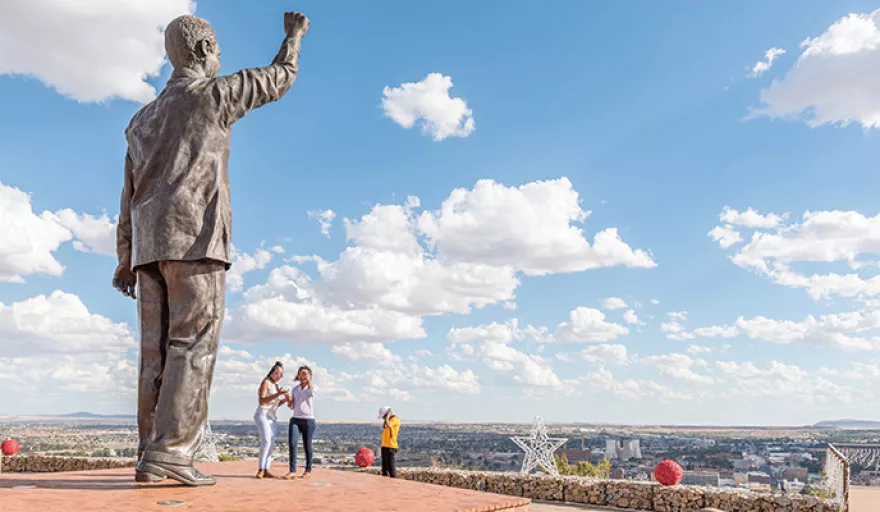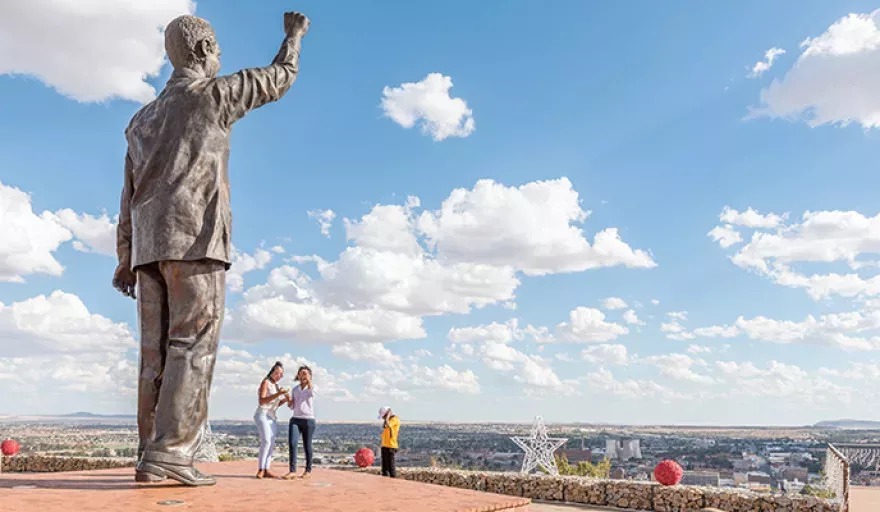
South Africa’s natural beauty and cultural fascination is well-documented, and rightly so.
The tumultuous apartheid period came to an end in the 1990s, and since then the country has opened itself to the world both in terms of leisure and business tourism.
Major cities and MICE hubs are spread far and wide, some being thousands of miles from key settlements in other African countries. Another nuance of South Africa’s formation is the fact it has not one, but three recognised capitals – Pretoria is home to the country’s executive, Cape Town its legislature and Bloemfontein the judiciary.
Such is the nation’s growing standing on the global stage, it is one of few countries to host multiple sporting world cups. In 2010 it became the first African host of the FIFA World Cup, while it has also hosted the Rugby Union World Cup (1995) and in 2003 staged the vast majority of matches in the ICC Cricket World Cup.
South Africa also comes into its own in terms of its hugely varied and extraordinary terrain. From the enormous Blyde River Canyon to Table Mountain and dramatic coastal roads to the Karoo and Kalahari deserts, this is an outdoor lover’s paradise, the perfect backdrop for businesses to host meetings, events and conferences.
Throw in a largely comfortable temperate climate that sees plenty of sunshine, and you will find the complete tourist package.
The Business End
The tourist trade is gathering increasing momentum as South Africa seeks to make the most out of its formidable attractions.
In 2017, one in every 22 employed people in South Africa were working in the tourism sector, totalling 722,013 individuals, around 4.5 percent of the 16.2 million people making up the national workforce.
The tourism sector contributed 2.8 percent (or R130 billion) to South Africa’s GDP in 2017, making it larger than the agriculture, forestry and fishing industry.
According to Statistics South Africa, in 2017 visitors sent over half a million rand every minute, amounting to R277 billion for the entire year, the split being 56 percent domestic spend and 44 percent international.
In terms of numbers arriving, 2018 saw 16.44 million visitors arrive in the country – this represents a steady rise over the past six years, the figure for 2012 being 14.16 million. The upward trajectory is set continue for the next few years according to the latest predictions from research organisation Statista, which forecasts some 19.6 million tourists to visit South Africa in 2023.
Away from tourism, foreign trade is another key contributor to the nation’s income, with China, the USA, Germany and Namibia alone accounting for more than a quarter of exports. Key export products include precious metals, agricultural goods and military equipment, while South Africa’s major imports include chemicals and motor vehicles.
Southern African Association for the Conference Industry
Founded in 1987 by Nick Stathakis and Keith McCusker, the Southern African Association for the Conference Industry, better known as SAACI, is a governing body mandated to improve the standards in conference facilities, meeting venues and allied services within South Africa and the wider region.
It is a thought leadership pioneer in the MICE tourism space, hosting numerous events and conducting several projects (such as Project RISE) to raise the profile of the Southern Africa as a destination for business travel.
Having spoken with the organisation in 2018, here we catch up with Kim Roberts, Vice-Chairperson of SAACI, to get the latest insight on South African tourism, as well as some detail on what SAACI has planned for the year ahead.
Africa Outlook (AfO): How would you say South Africa has developed recently as a business travel hub and what are the key reasons behind its growing appeal?
Kim Roberts (KR): South Africa has worked really hard on its exposure to the international marketplace. The increase of international conventions coming into South Africa as a result of stronger market positioning, has allowed for more feet on our shores. The unique experiences on offer in South Africa, as well as the way we as a nation ‘touch the hearts of those that visit these shores, almost always result in return business for both the business events and leisure sectors.
Increased accessibility into South Africa has improved with new airline routes being added. There is so much opportunity within Africa and we look forward to seeing those routes becoming less complicated. Many African countries require a link in the Middle East or Europe in order to then get to South Africa – this change will certainly aid in economic growth.
AfO: Why, in your opinion, should someone visit South Africa?
KR: It is the home mankind, the real roots of the human race. One comes to South Africa and there is a spiritual connection with the land, along with its natural beauty, friendly people and sophisticated infrastructure.
AfO: Are there any specific attractions, landmarks or places to eat and drink that you would recommend?
KR: I would have to say a visit to Maropeng. If I was a tour guide and could share my favourite places, the itinerary would cover a self-drive to Mpumalanga and include the Kruger National Park, the Eastern Cape wild shoreline, our winelands and the city of Cape Town. Not to forget that sunrise walk to the top of Lions Head.
With regards to eating and drinking, we have numerous fabulous restaurants and local beverages to enjoy, I would just say try someone completely local or authentic, anywhere in South Africa.
AfO: What are the best ways of getting around the country?
KR: As a first-time visitor we would encourage a registered guide to assist with your planning and even travel if possible. The local airlines are well established and can easily meet your destination needs. Gauteng has a world class rail infrastructure in the Gautrain, to get you into the City of Gold. There are options for taxis and buses, and we would just advise that they belong to recognised bodies. For experienced visitors to South Africa, a self-drive option could make for the trip of a lifetime.
AfO: What trends are transforming the tourism industry in South Africa at present? How are you responding to these trends?
KR: Three I would identify are technology, sustainability and a focus on service excellence.
Our association stays abreast of what is happening internationally – and what works in South Africa – and shares this with members on a number of platforms. They apply this in their businesses, helping the tourism industry to grow.
AfO: How do you see the country developing as a business travel hub over the next year to two years?
KR: With our convention bureaus in place we continue to see growth in this space. These entities are highly focused on the Tourism Ministry’s mandate to drive economic growth and with that we are fortunate to see the growing numbers in events and expos.
There are always new facilities joining the South African meetings landscape. These properties will bring new and exciting spaces for delegates to enjoy.
AfO: Are there any plans or projects in the pipeline that you wish to highlight?
KR: We are busy with the roll out of the RISE project, a skills development programme to facilitate entry for new suppliers into the business events industry.
Having just had our 2019 congress, that had a very strong learning programme, we are already starting to work on 2020’s content and the framework of this event, to ensure we deliver as the lead in the conference industry
Also, in the next three months, we will be holding a strategic meeting to focus on where and what our next priorities will be.
AfO: Are you optimistic about the future of the tourism industry in South Africa?
KR: Yes, you have to be. As someone recently shared with me, what you visualise you actualise.
In Focus: Convention centres in South Africa
South Africa is home to some of the region’s most impressive conferencing and event hosting facilities.
In the past the country has hosted global landmark events such as the 2011 United Nations Climate Change Conference (COP17) in Durban. In 2016, the same city hosted the 21st AIDS Conference at the Inkosi Albert Luthuli International Convention Centre, a venue which housed 18,000 delegates from 183 countries.
Durban is not the only major city home to world-class exhibition facilities, however. Among the other highly rated venues are Sandton Convention Centre (Johannesburg), Tshwane Events Centre, East London International Convention Centre, Cape Town International Convention Centre and CSIR International Convention Centre (Pretoria), to name but a few.
As well as SAACI, an important organisation helping to promote and assist convention centres and event organisers is the South Africa National Convention Centre (SANCB).
A one-stop solution for independent information and assistance, giving neutral advice on all aspects of hosting and organising any business event in South Africa, one of SANCB’s major roles is to help venues bid and prepare for hosting conventions.
In 2015, for example, South Africa hosted 140 international meetings and conferences at its various convention centres and event venues, attracting around 80,000 delegates and generating more than R1 billion in economic impact.
Transport Links
South Africa is home to a number of budget airlines such as CemAir, Kulula, Mango and FlySafair that serve most domestic routes at competitive prices. It is an easy way of getting from one major destination to another, especially given the long distances between some of the major cities.
Shosholoza Meyl offers regular train services, including a popular overnight journey between Cape Town and Johannesburg that allows passengers to take in the vastness of the country’s landscapes.
Travel by boat between the coastal settlements of Port Elizabeth, Cape Town and Durban and onto the likes of Mozambique present an alternative way of getting around, with car hire perhaps the obvious and most flexible option.
Regionally, South Africa offers some tremendous cycling opportunities. Hills, views and campsites are in abundance, while bikes can be taken onto most trains. Local bus networks are extensive and usually cheap to use.
In terms of international air travel, OR Tambo near Johannesburg is the major hub, with other significant airports to be found in Cape Town and Durban. National carrier South African Airways operates an extensive network of long-haul flights to destinations all over the world.






























